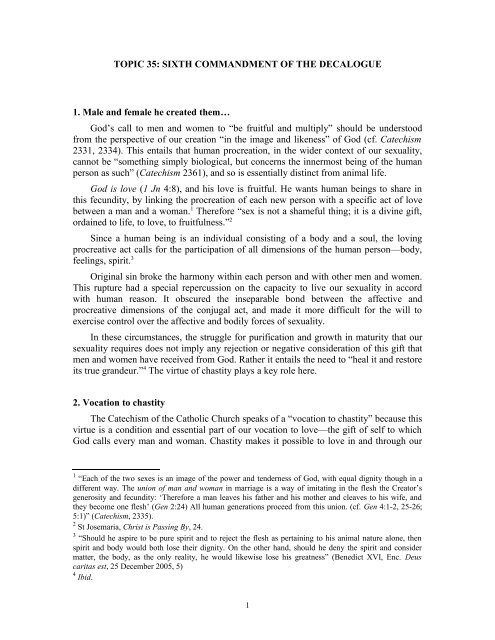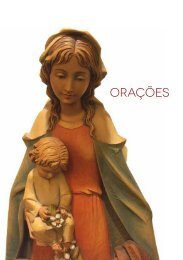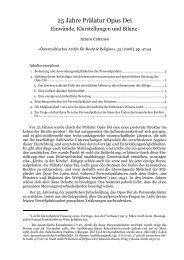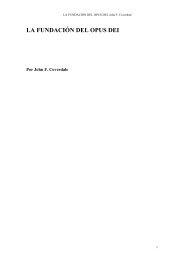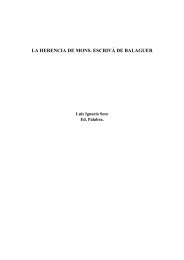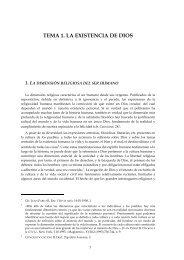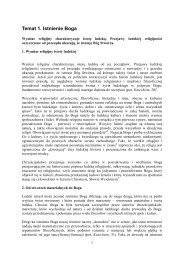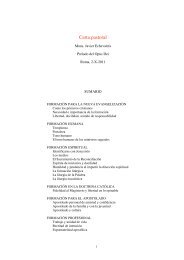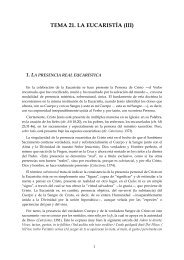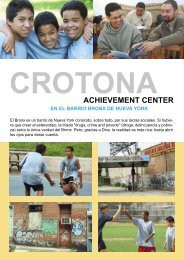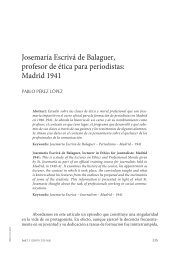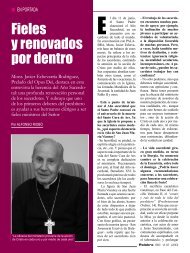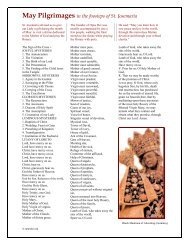Sixth Commandment of the Decalogue
Sixth Commandment of the Decalogue
Sixth Commandment of the Decalogue
You also want an ePaper? Increase the reach of your titles
YUMPU automatically turns print PDFs into web optimized ePapers that Google loves.
TOPIC 35: SIXTH COMMANDMENT OF THE DECALOGUE<br />
1. Male and female he created <strong>the</strong>m…<br />
God’s call to men and women to “be fruitful and multiply” should be understood<br />
from <strong>the</strong> perspective <strong>of</strong> our creation “in <strong>the</strong> image and likeness” <strong>of</strong> God (cf. Catechism<br />
2331, 2334). This entails that human procreation, in <strong>the</strong> wider context <strong>of</strong> our sexuality,<br />
cannot be “something simply biological, but concerns <strong>the</strong> innermost being <strong>of</strong> <strong>the</strong> human<br />
person as such” (Catechism 2361), and so is essentially distinct from animal life.<br />
God is love (1 Jn 4:8), and his love is fruitful. He wants human beings to share in<br />
this fecundity, by linking <strong>the</strong> procreation <strong>of</strong> each new person with a specific act <strong>of</strong> love<br />
between a man and a woman. 1 Therefore “sex is not a shameful thing; it is a divine gift,<br />
ordained to life, to love, to fruitfulness.” 2<br />
Since a human being is an individual consisting <strong>of</strong> a body and a soul, <strong>the</strong> loving<br />
procreative act calls for <strong>the</strong> participation <strong>of</strong> all dimensions <strong>of</strong> <strong>the</strong> human person—body,<br />
feelings, spirit. 3<br />
Original sin broke <strong>the</strong> harmony within each person and with o<strong>the</strong>r men and women.<br />
This rupture had a special repercussion on <strong>the</strong> capacity to live our sexuality in accord<br />
with human reason. It obscured <strong>the</strong> inseparable bond between <strong>the</strong> affective and<br />
procreative dimensions <strong>of</strong> <strong>the</strong> conjugal act, and made it more difficult for <strong>the</strong> will to<br />
exercise control over <strong>the</strong> affective and bodily forces <strong>of</strong> sexuality.<br />
In <strong>the</strong>se circumstances, <strong>the</strong> struggle for purification and growth in maturity that our<br />
sexuality requires does not imply any rejection or negative consideration <strong>of</strong> this gift that<br />
men and women have received from God. Ra<strong>the</strong>r it entails <strong>the</strong> need to “heal it and restore<br />
its true grandeur.” 4 The virtue <strong>of</strong> chastity plays a key role here.<br />
2. Vocation to chastity<br />
The Catechism <strong>of</strong> <strong>the</strong> Catholic Church speaks <strong>of</strong> a “vocation to chastity” because this<br />
virtue is a condition and essential part <strong>of</strong> our vocation to love—<strong>the</strong> gift <strong>of</strong> self to which<br />
God calls every man and woman. Chastity makes it possible to love in and through our<br />
1 “Each <strong>of</strong> <strong>the</strong> two sexes is an image <strong>of</strong> <strong>the</strong> power and tenderness <strong>of</strong> God, with equal dignity though in a<br />
different way. The union <strong>of</strong> man and woman in marriage is a way <strong>of</strong> imitating in <strong>the</strong> flesh <strong>the</strong> Creator’s<br />
generosity and fecundity: ‘Therefore a man leaves his fa<strong>the</strong>r and his mo<strong>the</strong>r and cleaves to his wife, and<br />
<strong>the</strong>y become one flesh’ (Gen 2:24) All human generations proceed from this union. (cf. Gen 4:1-2, 25-26;<br />
5:1)” (Catechism, 2335).<br />
2 St Josemaria, Christ is Passing By, 24.<br />
3 “Should he aspire to be pure spirit and to reject <strong>the</strong> flesh as pertaining to his animal nature alone, <strong>the</strong>n<br />
spirit and body would both lose <strong>the</strong>ir dignity. On <strong>the</strong> o<strong>the</strong>r hand, should he deny <strong>the</strong> spirit and consider<br />
matter, <strong>the</strong> body, as <strong>the</strong> only reality, he would likewise lose his greatness” (Benedict XVI, Enc. Deus<br />
caritas est, 25 December 2005, 5)<br />
4 Ibid.<br />
1
odies. 5 In a certain way, it could be said that chastity is <strong>the</strong> virtue that enables a human<br />
person to live well, with benevolence and interior peace in relation to o<strong>the</strong>r men and<br />
women and to oneself, because human sexuality influences all our capacities from <strong>the</strong><br />
most physical and material to <strong>the</strong> most spiritual, giving a masculine or feminine tint to all<br />
our faculties.<br />
Thus <strong>the</strong> virtue <strong>of</strong> chastity is not simply a remedy against <strong>the</strong> disorder sin gives rise<br />
to in human sexuality, but a joyful affirmation, since it enables us to love God and,<br />
through him, o<strong>the</strong>r men and women, with our whole heart, all whole our soul, our whole<br />
mind and our whole strength (cf. Mt 12:30). 6<br />
“The virtue <strong>of</strong> chastity comes under <strong>the</strong> cardinal virtue <strong>of</strong> temperance, which seeks<br />
to permeate <strong>the</strong> passions and appetites <strong>of</strong> <strong>the</strong> senses with reason” (Catechism 2341).<br />
“Chastity means <strong>the</strong> successful integration <strong>of</strong> sexuality within <strong>the</strong> person and thus <strong>the</strong><br />
inner unity <strong>of</strong> man in his bodily and spiritual being” (Catechism 2337).<br />
When speaking about chastity, especially with young people, it is important to stress<br />
<strong>the</strong> capacity to love that this virtue imparts to sexuality and procreation. O<strong>the</strong>rwise,<br />
chastity could come to be seen as a negative virtue, since a good part <strong>of</strong> <strong>the</strong> struggle to<br />
live chastity involves <strong>the</strong> struggle to control one’s passions, which at times can be<br />
directed towards a particular good that cannot be rationally ordered to <strong>the</strong> good <strong>of</strong> <strong>the</strong><br />
person as a whole. 7<br />
In his present state, man cannot live in accord with <strong>the</strong> natural moral law, and hence<br />
be chaste, without <strong>the</strong> help <strong>of</strong> grace. This does not imply <strong>the</strong> impossibility <strong>of</strong> acquiring<br />
<strong>the</strong> human virtue that brings a certain control over one’s passions, but ra<strong>the</strong>r that <strong>the</strong><br />
wound caused by sin is so deep that only divine help can bring about a perfect<br />
reintegration <strong>of</strong> <strong>the</strong> human person. 8<br />
3. Educating for chastity<br />
5 “God is love and in himself He lives a mystery <strong>of</strong> personal loving communion. Creating <strong>the</strong> human race<br />
in his own image … God inscribed in <strong>the</strong> humanity <strong>of</strong> man and woman <strong>the</strong> vocation, and thus <strong>the</strong> capacity<br />
and responsibility, <strong>of</strong> love and communion” (John Paul II, Apost. Ex. Familiaris consortio, 22 November<br />
1981, 11).<br />
6 “Chastity is <strong>the</strong> joyous affirmation <strong>of</strong> someone who knows how to live self-giving, free from any form <strong>of</strong><br />
self-centred slavery” (Pontifical Council for <strong>the</strong> Family, The Truth and Meaning <strong>of</strong> Human Sexuality, 8<br />
December 1995, 17). “Purity is a consequence <strong>of</strong> <strong>the</strong> love that prompts us to commit to Christ our soul and<br />
body, our faculties and senses. It is not something negative; it is a joyful affirmation” (St Josemaria, Christ<br />
is Passing By, 5).<br />
7 “Chastity includes an apprenticeship in self-mastery which is a training in human freedom. The<br />
alternative is clear: ei<strong>the</strong>r man governs his passions and finds peace, or he lets himself be dominated by<br />
<strong>the</strong>m and becomes unhappy (cf. Sir 1:22). ‘Man's dignity <strong>the</strong>refore requires him to act out <strong>of</strong> conscious and<br />
free choice, as moved and drawn in a personal way from within, and not by blind impulses in himself or by<br />
mere external constraint. Man gains such dignity when, ridding himself <strong>of</strong> all slavery to <strong>the</strong> passions, he<br />
presses forward to his goal by freely choosing what is good and, by his diligence and skill, effectively<br />
secures for himself <strong>the</strong> means suited to this end’ (Gaudium et spes, 17)” (Catechism 2339).<br />
8 “Chastity is a moral virtue. It is also a gift from God, a grace, a fruit <strong>of</strong> spiritual effort. (cf. Gal 5:22). The<br />
Holy Spirit enables one whom <strong>the</strong> water <strong>of</strong> Baptism has regenerated to imitate <strong>the</strong> purity <strong>of</strong> Christ (cf. 1 Jn<br />
3:3)” (Catechism 2345).<br />
2
Chastity is aimed at attaining control <strong>of</strong> one’s concupiscence, an important part <strong>of</strong><br />
self-mastery. Attaining this control is a task that lasts for one’s whole life and that calls<br />
for repeated efforts, which can be particularly demanding at certain periods. Chastity<br />
should always keep growing with <strong>the</strong> grace <strong>of</strong> God and each one’s personal ascetical<br />
struggle (cf. Catechism 2342). 9<br />
“Charity is <strong>the</strong> form <strong>of</strong> all <strong>the</strong> virtues. Under its influence, chastity appears as a<br />
school <strong>of</strong> <strong>the</strong> gift <strong>of</strong> <strong>the</strong> person. Self-mastery is ordered to <strong>the</strong> gift <strong>of</strong> self” (Catechism<br />
2346).<br />
Educating for chastity is much more than what some reductively call “sex<br />
education,” usually limited to giving information on <strong>the</strong> physiological aspects <strong>of</strong> human<br />
reproduction and methods <strong>of</strong> contraception. A true education in chastity involves much<br />
more than <strong>the</strong> biological aspects. It needs to provide help in reflecting on <strong>the</strong> personal and<br />
moral values involved in <strong>the</strong> issues <strong>of</strong> human life and personal maturity. Moreover, it<br />
needs to foster high ideals <strong>of</strong> love for God and o<strong>the</strong>r men and women, through virtues<br />
such as generosity, self-giving, <strong>the</strong> modesty that protects intimacy, etc. —virtues that<br />
help a person to overcome selfishness and <strong>the</strong> temptation to become self-centered.<br />
Parents have a great responsibility in this task, since <strong>the</strong>y are <strong>the</strong> first and principal<br />
teachers in instilling <strong>the</strong> virtue <strong>of</strong> chastity in <strong>the</strong>ir children. 10<br />
In <strong>the</strong> struggle to live this virtue, <strong>the</strong> following means are important:<br />
a) prayer: asking God for <strong>the</strong> virtue <strong>of</strong> holy purity; 11 frequenting <strong>the</strong><br />
sacraments, which are <strong>the</strong> “medicine” for our weakness;<br />
b) working intensely, avoiding idleness;<br />
c) moderation in food and drink;<br />
d) caring for details <strong>of</strong> decency and modesty in dress, etc.;<br />
e) avoiding unsuitable books, magazines and newspapers, and immoral shows;<br />
f) being very sincere in spiritual direction;<br />
g) not thinking about oneself;<br />
h) having a deep devotion to Mary Most Holy, Mater pulchrae dilectionis.<br />
Chastity, while an eminently personal virtue, “involves a cultural effort” (Catechism<br />
2344), since <strong>the</strong>re is “an interdependence between personal betterment and <strong>the</strong><br />
9 Personal maturity includes self-mastery, which requires modesty and temperance, as well as respect for,<br />
and being open to, o<strong>the</strong>rs (cf. Congregation for Catholic Education, Educational orientations on human<br />
love, 1 November 1983, 35).<br />
10 This aspect <strong>of</strong> education is <strong>of</strong> greater importance now than in <strong>the</strong> past because today’s society provides<br />
many negative models in this areas (cf. Pontifical Council for <strong>the</strong> Family, The Truth and Meaning <strong>of</strong><br />
Human Sexuality, 8 December 1995, 47). “Faced with a culture that largely reduces human sexuality to <strong>the</strong><br />
level <strong>of</strong> something commonplace, since it interprets and lives it in a reductive and impoverished way by<br />
linking it solely with <strong>the</strong> body and with selfish pleasure, <strong>the</strong> educational service <strong>of</strong> parents must aim firmly<br />
at a training in <strong>the</strong> area <strong>of</strong> sex that is truly and fully personal” (John Paul II, Familiaris consortio, 37).<br />
11 “Holy purity is granted by God when it is asked for with humility” (St Josemaria, The Way, 118).<br />
3
improvement <strong>of</strong> society.” 12 Respect for <strong>the</strong> rights <strong>of</strong> <strong>the</strong> person requires respect for<br />
chastity, and particularly <strong>the</strong> right “to receive information and an education that respect<br />
<strong>the</strong> moral and spiritual dimensions <strong>of</strong> human life” (Catechism 2344). 13<br />
The specific manifestations <strong>of</strong> this virtue will differ depending on one’s vocation.<br />
“Married people are called to live conjugal chastity; o<strong>the</strong>rs practice chastity in<br />
continence” (Catechism 2349).<br />
4. Chastity in marriage<br />
Sexual union “is ordered to <strong>the</strong> conjugal love <strong>of</strong> man and woman” (Catechism 2360);<br />
“it is realized in a truly human way only if it is an integral part <strong>of</strong> <strong>the</strong> love by which a<br />
man and a woman commit <strong>the</strong>mselves totally to one ano<strong>the</strong>r until death.” 14<br />
The grandeur <strong>of</strong> <strong>the</strong> act whereby man and woman cooperate freely with God’s<br />
creative action requires certain strict moral conditions, precisely because <strong>of</strong> its deep<br />
human meaning: <strong>the</strong> capacity to engender a new human life called to eternal happiness.<br />
This is why one should never voluntarily separate <strong>the</strong> unitive and procreative dimensions<br />
<strong>of</strong> this act, as happens with contraception. 15<br />
Chaste couples will find <strong>the</strong> most adequate moments to live this bodily union so that<br />
in each act it always reflects <strong>the</strong> gift <strong>of</strong> self it signifies. 16<br />
Unlike <strong>the</strong> procreative dimension, which can be realized in a truly human way only<br />
through <strong>the</strong> conjugal act, <strong>the</strong> unitive and affective dimension proper to this act can and<br />
should be manifested in many o<strong>the</strong>r ways. Hence, if for reasons <strong>of</strong> health or o<strong>the</strong>r<br />
reasons, <strong>the</strong> spouses cannot carry out <strong>the</strong> conjugal union, or if <strong>the</strong>y decide that it is<br />
preferable to abstain temporarily (or permanently in particularly serious situations) from<br />
<strong>the</strong> conjugal act, <strong>the</strong>y can and should continue making this gift <strong>of</strong> self a reality, which<br />
fosters <strong>the</strong> growth <strong>of</strong> a truly personal love.<br />
5. Chastity in celibacy<br />
God calls some people to live <strong>the</strong>ir vocation to love in a special way, in apostolic<br />
12<br />
Vatican Council II, Const. Gaudium et spes, 25.<br />
13<br />
John Paul II spoke about <strong>the</strong> need to foster a genuine “human ecology” in <strong>the</strong> sense <strong>of</strong> achieving a<br />
healthy moral environment that will facilitate <strong>the</strong> human development <strong>of</strong> <strong>the</strong> person (cf., for example, Enc.<br />
Centesimus annus, 1 May 1991, 38). Part <strong>of</strong> <strong>the</strong> “cultural effort” mentioned above consists in making clear<br />
<strong>the</strong> need to respect certain moral norms in <strong>the</strong> media, especially in television, to safeguard <strong>the</strong> dignity <strong>of</strong><br />
<strong>the</strong> human person. “In <strong>the</strong>se times <strong>of</strong> violence and <strong>of</strong> brutal, savage sexuality, we have to be rebels: we<br />
refuse point blank to go with <strong>the</strong> tide, and become beasts. We want to behave like children <strong>of</strong> God, like<br />
men and women who are on intimate terms with <strong>the</strong>ir Fa<strong>the</strong>r, who is in Heaven and who wants to be very<br />
close to—inside!—each one <strong>of</strong> us” (St Josemaria, The Forge, 15).<br />
14<br />
John Paul II, Familiaris consortio, 11.<br />
15<br />
Also in artificial fertilization <strong>the</strong>re is a rupture between <strong>the</strong>se two dimensions proper to human sexuality,<br />
as <strong>the</strong> Instruction Donum vitae (1987) makes clear.<br />
16<br />
As <strong>the</strong> Catechism <strong>of</strong> <strong>the</strong> Catholic Church teaches, <strong>the</strong> pleasure accompanying conjugal union is<br />
something good and desired by God (cf. Catechism 2362).<br />
4
celibacy. 17 Living <strong>the</strong> Christian vocation in apostolic celibacy requires continence. 18<br />
Excluding <strong>the</strong> use <strong>of</strong> one’s reproductive capacity in no way entails excluding love or<br />
affection. 19 On <strong>the</strong> contrary, freely giving to God <strong>the</strong> possibility <strong>of</strong> a married life enables<br />
one to love and to give oneself to many o<strong>the</strong>r men and women, helping <strong>the</strong>m in turn to<br />
find God, which is <strong>the</strong> reason for <strong>the</strong>ir celibacy. 20<br />
This way <strong>of</strong> life must always be viewed and lived as a gift, since no one can attribute<br />
to himself or herself <strong>the</strong> capacity to be faithful to God in this path <strong>of</strong> life without <strong>the</strong> help<br />
<strong>of</strong> grace.<br />
6. Sins against chastity<br />
Opposed to chastity is lust, a “disordered desire for or inordinate enjoyment <strong>of</strong><br />
sexual pleasure. Sexual pleasure is morally disordered when sought for itself, isolated<br />
from its procreative and unitive purposes” (Catechism 2351).<br />
Since sexuality is a central dimension in human life, sins against chastity are always<br />
materially grave and as such entail losing <strong>the</strong> inheritance <strong>of</strong> <strong>the</strong> Kingdom <strong>of</strong> God (cf. Eph<br />
5:5). However <strong>the</strong>y can be venial when full awareness or perfect consent is lacking.<br />
The vice <strong>of</strong> lust has numerous serious consequences: mental blindness, which<br />
obscures our final end and our good; weakening <strong>of</strong> <strong>the</strong> will, which is made almost<br />
incapable <strong>of</strong> any effort, becoming passive, indifferent to work, to serving o<strong>the</strong>rs, etc.;<br />
attachment to earthly goods and forgetting eternal goods; and finally it can even lead to<br />
hatred for God, seen by a lustful person as <strong>the</strong> major obstacle to satisfying his sensuality.<br />
Masturbation is <strong>the</strong> “deliberate stimulation <strong>of</strong> <strong>the</strong> genital organs in order to derive<br />
sexual pleasure” (Catechism 2352). “Both <strong>the</strong> Magisterium <strong>of</strong> <strong>the</strong> Church in <strong>the</strong> course <strong>of</strong><br />
a constant tradition, and <strong>the</strong> moral sense <strong>of</strong> <strong>the</strong> faithful have been in no doubt and have<br />
firmly maintained that masturbation is an intrinsically and gravely disordered action.” 21<br />
By its very nature, masturbation contradicts <strong>the</strong> Christian sense <strong>of</strong> sexuality as being at<br />
<strong>the</strong> service <strong>of</strong> love. Being a solitary and selfish exercise <strong>of</strong> sexuality, deprived <strong>of</strong> <strong>the</strong> truth<br />
<strong>of</strong> love, it leaves a person unsatisfied and leads to emptiness and regret.<br />
“Fornication is carnal union between an unmarried man and an unmarried woman. It<br />
is gravely contrary to <strong>the</strong> dignity <strong>of</strong> persons and <strong>of</strong> human sexuality which is naturally<br />
ordered to <strong>the</strong> good <strong>of</strong> spouses and <strong>the</strong> generation and education <strong>of</strong> children. Moreover, it<br />
17 Although <strong>the</strong> measure <strong>of</strong> sanctity is <strong>the</strong> love one has for God and not one’s state in life, whe<strong>the</strong>r celibate<br />
or married, <strong>the</strong> Church teaches that celibacy for <strong>the</strong> Kingdom <strong>of</strong> Heaven is a gift superior to matrimony (cf.<br />
Council <strong>of</strong> Trent: DZ 1810; 1 Cor 7:38).<br />
18 We will not say anything specific here about priestly celibacy or virginity or consecrated celibacy. But<br />
from <strong>the</strong> moral point <strong>of</strong> view, total continence is required in each <strong>of</strong> <strong>the</strong>se situations.<br />
19 It would not make any sense to maintain that celibacy goes “against nature.” The fact that man and<br />
woman can complement one ano<strong>the</strong>r does not mean that <strong>the</strong>y complete one ano<strong>the</strong>r, because both are<br />
complete as human persons.<br />
20 When speaking <strong>of</strong> priestly celibacy (though applicable to all celibacy for <strong>the</strong> Kingdom <strong>of</strong> Heaven),<br />
Benedict XVI explains that it cannot be understood merely in functional terms because in reality “it<br />
represents a special configuration to <strong>the</strong> style <strong>of</strong> life <strong>of</strong> Christ himself” (Benedict XVI, Apost. Ex.<br />
Sacramentum caritatis, 24).<br />
21 Congregation for <strong>the</strong> Doctrine <strong>of</strong> <strong>the</strong> Faith, Decl. Persona humana, 29 December 1975, 9.<br />
5
is a grave scandal when <strong>the</strong>re is corruption <strong>of</strong> <strong>the</strong> young” (Catechism 2353). 22<br />
Adultery “refers to marital infidelity. When two partners, <strong>of</strong> whom at least one is<br />
married to ano<strong>the</strong>r party, have sexual relations—even transient ones—<strong>the</strong>y commit<br />
adultery” (Catechism 2380). 23<br />
Also opposed to chastity are conversations, looks, manifestations <strong>of</strong> affection for<br />
ano<strong>the</strong>r person, including fiancés, prompted by a lewd desire or constituting a near<br />
occasion <strong>of</strong> sin which is sought or not rejected. 24<br />
Pornography—displaying <strong>the</strong> human body as a mere object <strong>of</strong> concupiscence—and<br />
prostitution—making one’s own body an object for financial gain and for carnal pleasure<br />
—are grave faults <strong>of</strong> sexual disorder which, besides <strong>of</strong>fending <strong>the</strong> dignity <strong>of</strong> any person<br />
involved, are a true social scourge (cf. Catechism 2355).<br />
“Rape is <strong>the</strong> forcible violation <strong>of</strong> <strong>the</strong> sexual intimacy <strong>of</strong> ano<strong>the</strong>r person. It does<br />
injury to justice and charity. Rape deeply wounds <strong>the</strong> respect, freedom, and physical and<br />
moral integrity to which every person has a right. It causes grave damage that can mark<br />
<strong>the</strong> victim for life. It is always an intrinsically evil act. Graver still is <strong>the</strong> rape <strong>of</strong> children<br />
committed by parents (incest) or those responsible for <strong>the</strong> education <strong>of</strong> <strong>the</strong> children<br />
entrusted to <strong>the</strong>m” (Catechism 2356).<br />
“Homosexual acts are intrinsically disordered,” as <strong>the</strong> tradition <strong>of</strong> <strong>the</strong> Church has<br />
always declared. 25 This clear moral evaluation <strong>of</strong> acts must in no way prejudge those<br />
persons who have homosexual tendencies, 26 since not infrequently <strong>the</strong>ir condition<br />
involves a difficult trial. 27 Fur<strong>the</strong>rmore, <strong>the</strong>se persons “are called to chastity. By <strong>the</strong><br />
virtues <strong>of</strong> self-mastery that teach <strong>the</strong>m inner freedom, at times by <strong>the</strong> support <strong>of</strong><br />
disinterested friendship, by prayer and sacramental grace, <strong>the</strong>y can and should gradually<br />
22 Free unions or cohabitation without <strong>the</strong> intention to marry, trial unions when <strong>the</strong>re is an intention to<br />
marry and premarital relations all <strong>of</strong>fend <strong>the</strong> dignity <strong>of</strong> human sexuality and marriage. “They are contrary<br />
to <strong>the</strong> moral law. The sexual act must take place exclusively within marriage. Outside <strong>of</strong> marriage it always<br />
constitutes a grave sin and excludes one from sacramental communion” (Catechism 2390). A sincere gift <strong>of</strong><br />
self, freely made, must be permanent and lasting.<br />
23 Christ also condemns <strong>the</strong> desire to commit adultery (cf. Mt 5:27-28). In <strong>the</strong> New Testament, adultery is<br />
absolutely forbidden (cf. Mt 5:32; 19, 6; Mk 10:11; 1 Cor 6:9-10). The Catechism, when speaking <strong>of</strong><br />
<strong>of</strong>fenses against marriage, also mentions divorce, polygamy and contraception.<br />
24 “Those who are engaged to marry are called to live chastity in continence. They should see in this time<br />
<strong>of</strong> testing a discovery <strong>of</strong> mutual respect, an apprenticeship in fidelity, and <strong>the</strong> hope <strong>of</strong> receiving one ano<strong>the</strong>r<br />
from God. They should reserve for marriage <strong>the</strong> expressions <strong>of</strong> affection that belong to married love. They<br />
will help each o<strong>the</strong>r grow in chastity” (Catechism 2350).<br />
25 Congregation for <strong>the</strong> Doctrine <strong>of</strong> <strong>the</strong> Faith, Decl. Persona humana, 8. Such acts “are contrary to <strong>the</strong><br />
natural law. They close <strong>the</strong> sexual act to <strong>the</strong> gift <strong>of</strong> life. They do not proceed from a genuine affective and<br />
sexual complementarity. Under no circumstances can <strong>the</strong>y be approved” (Catechism 2357).<br />
26 Homosexuality designates <strong>the</strong> condition <strong>of</strong> those men and women who feel a sexual attraction, whe<strong>the</strong>r<br />
exclusive or predominant, for persons <strong>of</strong> <strong>the</strong> same sex. The possible situations where this can arise are very<br />
diverse and as a consequence extreme prudence is required when treating such cases.<br />
27 “The number <strong>of</strong> men and women who have deep-seated homosexual tendencies is not negligible. This<br />
inclination, which is objectively disordered, constitutes for most <strong>of</strong> <strong>the</strong>m a trial. They must be accepted<br />
with respect, compassion, and sensitivity. Every sign <strong>of</strong> unjust discrimination in <strong>the</strong>ir regard should be<br />
avoided. These persons are called to fulfill God’s will in <strong>the</strong>ir lives and, if <strong>the</strong>y are Christians, to unite to<br />
<strong>the</strong> sacrifice <strong>of</strong> <strong>the</strong> Lord’s Cross <strong>the</strong> difficulties <strong>the</strong>y may encounter from <strong>the</strong>ir condition” (Catechism<br />
2358).<br />
6
and resolutely approach Christian perfection” (Catechism 2359).<br />
Pablo Requena<br />
Basic Bibliography<br />
Catechism <strong>of</strong> <strong>the</strong> Catholic Church, 2331-2400.<br />
Benedict XVI, Enc. Deus caritas est, 25 December 2005, 1-18.<br />
John Paul II, Apost. Ex. Familiaris consortio, 22 November 1981.<br />
Recommended Reading<br />
St Josemaria, “For They Shall See God,” in Friends <strong>of</strong> God: Homilies, 175-189;<br />
“Marriage, a Christian Vocation,” in Christ is Passing By, 22-30.<br />
Congregation for <strong>the</strong> Doctrine <strong>of</strong> <strong>the</strong> Faith, Decl. Persona humana, 29 December 1975.<br />
Congregation for Catholic Education, Educational orientations on human love, 1<br />
November 1983.<br />
7


